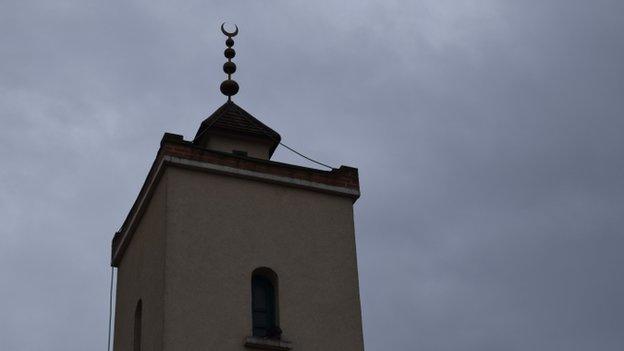Jewish alarm spreads after terror in France
- Published
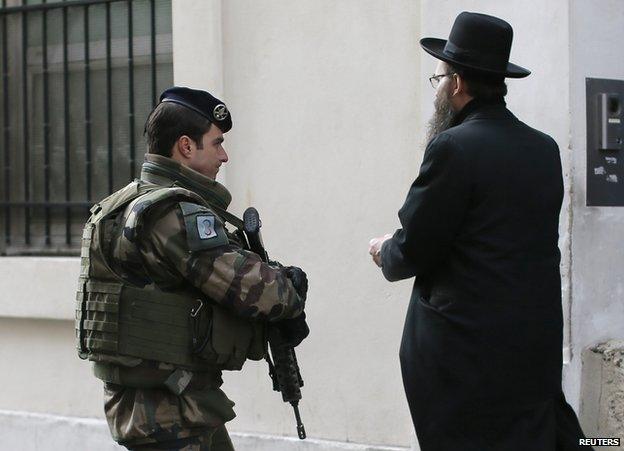
Paris: Soldiers have been deployed to protect Jewish communities in France
France and Belgium are preoccupied with the jihadist threat after the bloodshed in Paris and Verviers this month - and in both countries Jews feel they are on the front line.
France has an estimated 500,000 Jews - the largest Jewish minority in Western Europe - and many of them are wondering now how safe it is to stay.
Four Jewish men were killed by Islamist gunman Amedy Coulibaly in a kosher supermarket in Paris on 9 January, two days after 12 people were shot dead at Charlie Hebdo magazine by two Islamist brothers.
Now troops have joined police protecting potential Jewish targets - notably synagogues and schools - in Paris, Brussels and Antwerp.
"It's the worst time for Jews here since World War Two," said Robert Ejnes, director of the Jewish umbrella organisation Crif in France. "They are angry and worried."
Last year more than 7,000 left to settle in Israel (what Jews call "Aliyah") - double the 2013 figure, he noted. That does not include French Jews who moved to the UK, US or other countries.
In contrast, the number of British Jews making Aliyah is a few hundred annually, and remains fairly stable.
Mr Ejnes said there was an "anti-Semitic" element to the anti-Israel protests in and around Paris last July, when Jewish shops were attacked near a synagogue in Sarcelles.
Many Muslims were enraged by Israel's bombardment of Gaza - an offensive against Hamas militants, which killed more than 2,100 Palestinians, including many women and children, while 72 Israelis also died.
Mr Ejnes told the BBC that some demonstrators were "against the very existence of Israel" - a degree of hostility going beyond any legitimate criticism of Israeli policy.
"We have very good relations with moderate Islam - but a problem with radicalisation of the [Muslim] youth," he said.
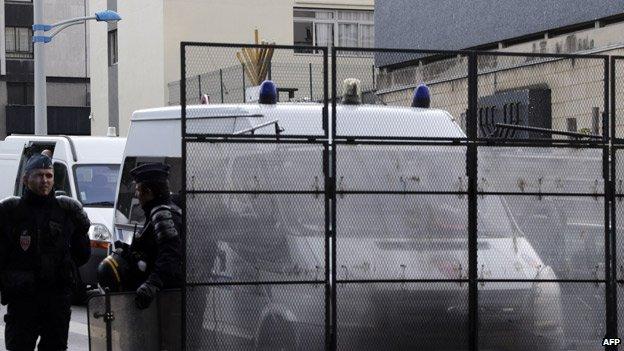
Sarcelles, July 2014: A police barrier keeps protesters away from a synagogue

What is anti-Semitism?
The EU has a "working definition" of anti-Semitism to help authorities in member states, though it does not have legal force. It says anti-Semitism is a "certain perception of Jews, which may be expressed as hatred toward Jews". It can be verbal or physical, or both, and targets Jewish individuals, or their property, or community institutions or religious facilities.
Most Jews surveyed by the EU's Agency for Fundamental Rights (FRA) regarded the following attitudes as anti-Semitic: "The Holocaust is a myth or has been exaggerated"; "Jews are responsible for the current economic crisis"; "Jews exploit Holocaust victimhood for their own purposes"; "Jews have too much power"; "Israelis behave like Nazis towards the Palestinians"; "Jews are not capable of integrating into society".
Anti-Semitism is also covered by the EU's 2008 framework decision, external on combating racism and xenophobia. That is a legal document.
It lists as a crime "publicly inciting to violence or hatred directed against a group of persons, or a member of such a group, defined by reference to race, colour, religion, descent or national or ethnic origin". Also punishable is: "publicly condoning, denying or grossly trivialising crimes of genocide, crimes against humanity and war crimes".

Dieudonne scandal
After this month's terror attacks in Paris, French Prime Minister Manuel Valls denounced "the new anti-Semitism".
It was fuelled by the internet, poverty in certain districts, and hatred of Israel, and was "preaching hatred of all Jews", he said.
The controversial comedian Dieudonne has been convicted repeatedly for inciting hatred of Jews and banned from performing. Now he is in trouble for saying he felt like "Charlie Coulibaly", seen as mocking the terror victims.
Yet he has a huge fan base, created via social media - mostly young fans who like his crude, inflammatory anti-establishment and anti-Semitic rhetoric. His much-imitated "quenelle" gesture has been compared to the Nazi salute.
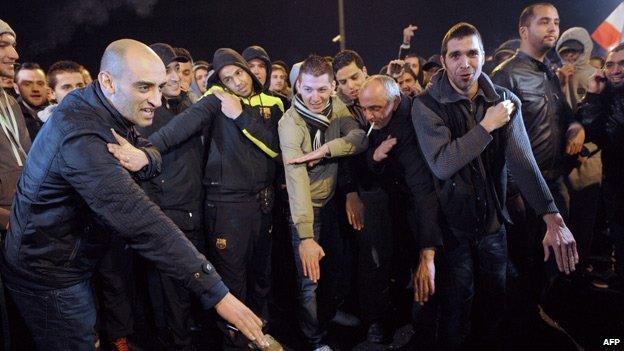
French fans of Dieudonne copy his controversial "quenelle" salute
Two previous Islamist terror attacks contributed to the anxiety in French and Belgian Jewish communities.
In 2012 Mohamed Merah killed three Jewish children and a rabbi in Toulouse, as well as three unarmed French soldiers.
Another French Islamist, Mehdi Nemmouche, has been charged with murder of four people at the Jewish Museum in Brussels in May 2014.
A French think-tank, Fondapol, reports that anti-Semitic offences increased by more than 90% last year in France.
It also says half of recorded racist attacks targeted Jews, who make up no more than 1% of the population.
Surveys do not reveal the full scale of the problem, researchers say, as many anti-Semitic incidents go unreported. The same can be said for racism generally.
Fondapol's November 2014 opinion poll on anti-Semitism, external, conducted by Ifop, suggests that anti-Semitic prejudices are most prevalent among fundamentalist Muslims and supporters of Marine Le Pen's nationalist Front National (FN).
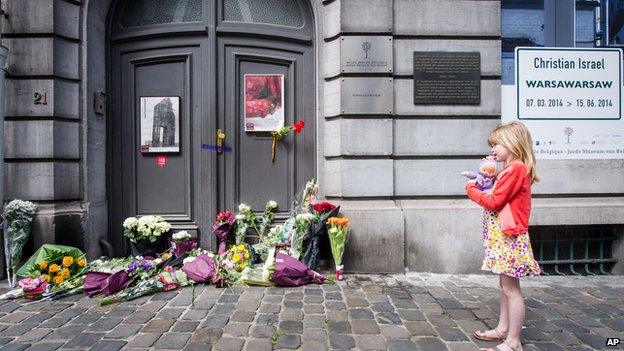
Belgium remains haunted by the Jewish Museum killings in May 2014
Belgium alert
In neighbouring Belgium the Jewish community set up a crisis management centre after Merah's 2012 atrocity.
Maurice Sosnowski, president of Belgium's Jewish umbrella group CCOJB, said anti-Semitism "is coming back to the pre-World War Two level". It had been suppressed since 1945 because of general horror at the Nazi crimes against Jews, he said.
"For years now, in some areas, Jews have been afraid to wear the kippa (skullcap); they feared being assaulted in the metro.
"A lot of Jewish kids left public schools, to go to Jewish schools - it's a bad sign," he told the BBC.
He said Belgian politicians should speak out more against anti-Semitism.
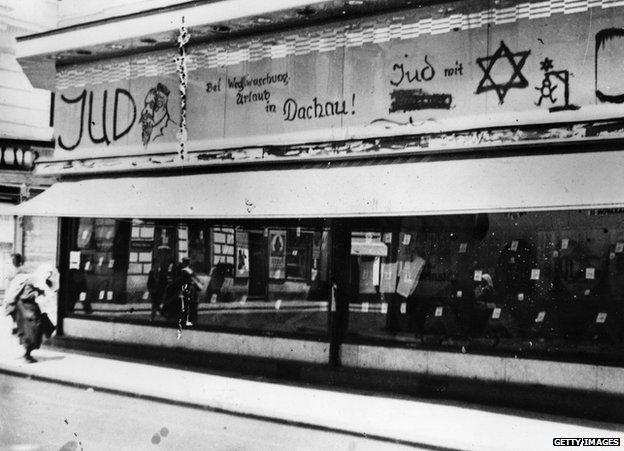
Vienna, 1938: Nazis daubed anti-Semitic graffiti on a Jewish tailor's shop
Belgium's Jews - about 38,000 in total - nearly all live in Brussels and Antwerp.
After police clashed with suspected jihadists in Verviers, killing two, Jewish schools were closed as a security measure. "Everyone accepted that decision, because they were anxious," Mr Sosnowski said.
Jewish leaders in Germany and the UK are worried about anti-Semitism too, but view the situation in France as worse.
This month Josef Schuster, head of Germany's Central Council of Jews, said he was glad that so many "average citizens" had rallied to defend human rights, against the Pegida nationalist movement.
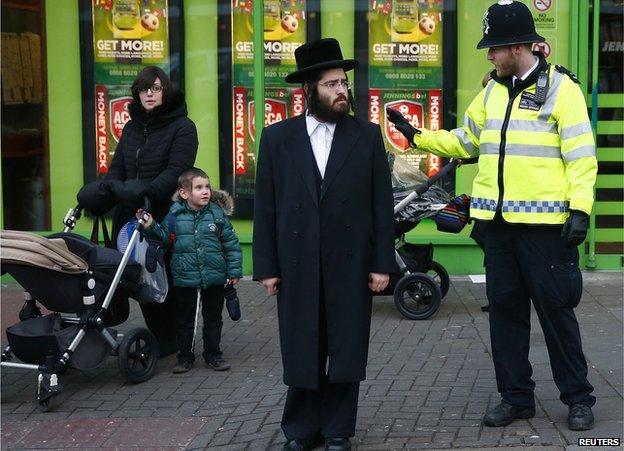
Police have also stepped up patrols in London's Jewish communities
The survey of European Jews , externalby the EU's Agency for Fundamental Rights (FRA) in 2013 found that 76% felt anti-Semitism had got worse in recent years.
In the UK fewer than half considered anti-Semitism to be a big problem in their country, while in France the figure was 85%.
"You'd have to pay me a lot of money to live in France or Belgium now," said Marc Cohen, a member of the Board of Deputies of British Jews.
Nationalist parties have been gaining ground in much of Europe, including the FN in France, Golden Dawn in Greece and Hungary's Jobbik.
Such extremism "is not endorsed by anyone in our government - that's a big difference," said Mr Cohen, noting that anti-Semitism had once tainted the British establishment.
Now the worry is "anti-Zionism merging into anti-Semitism" in British society, he said. "The lines are incredibly blurred, but you know it when you see it."
- Published21 January 2015
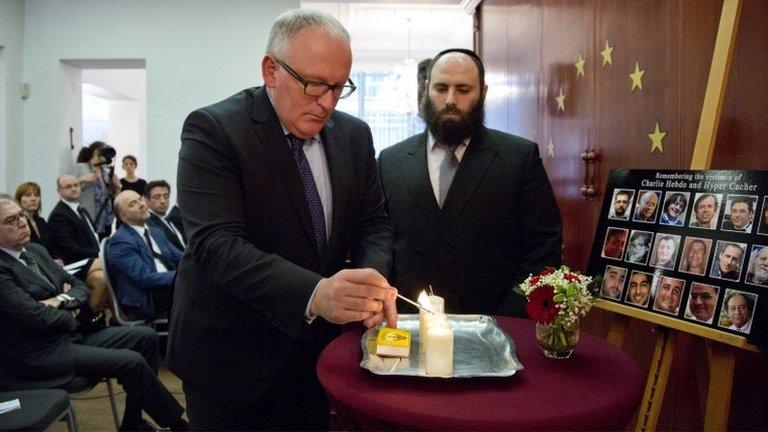
- Published19 January 2015
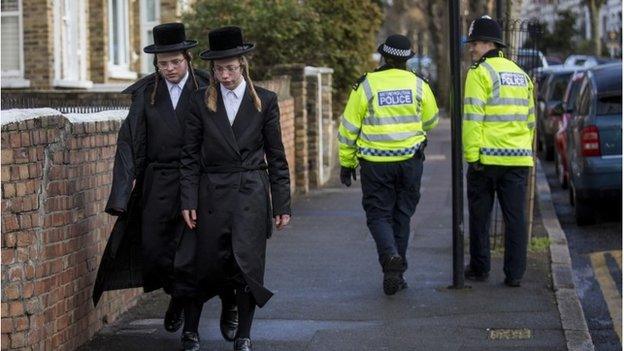
- Published16 January 2015
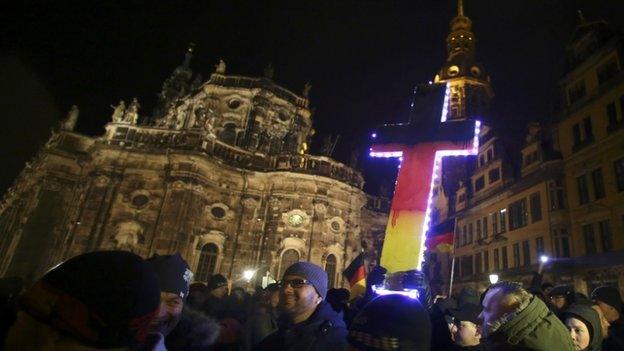
- Published13 January 2015
